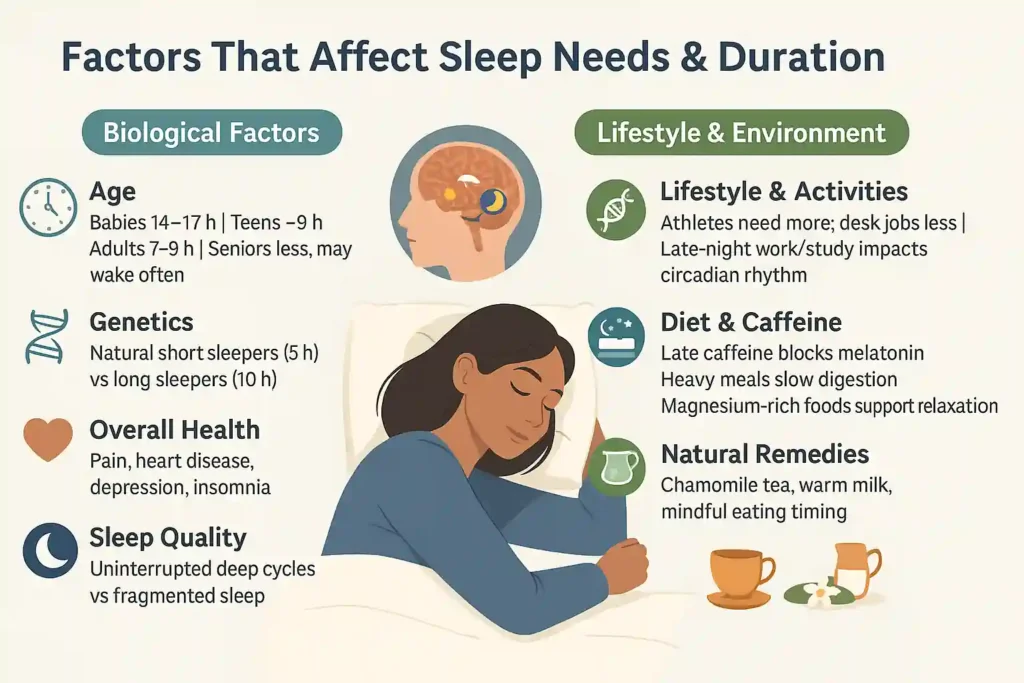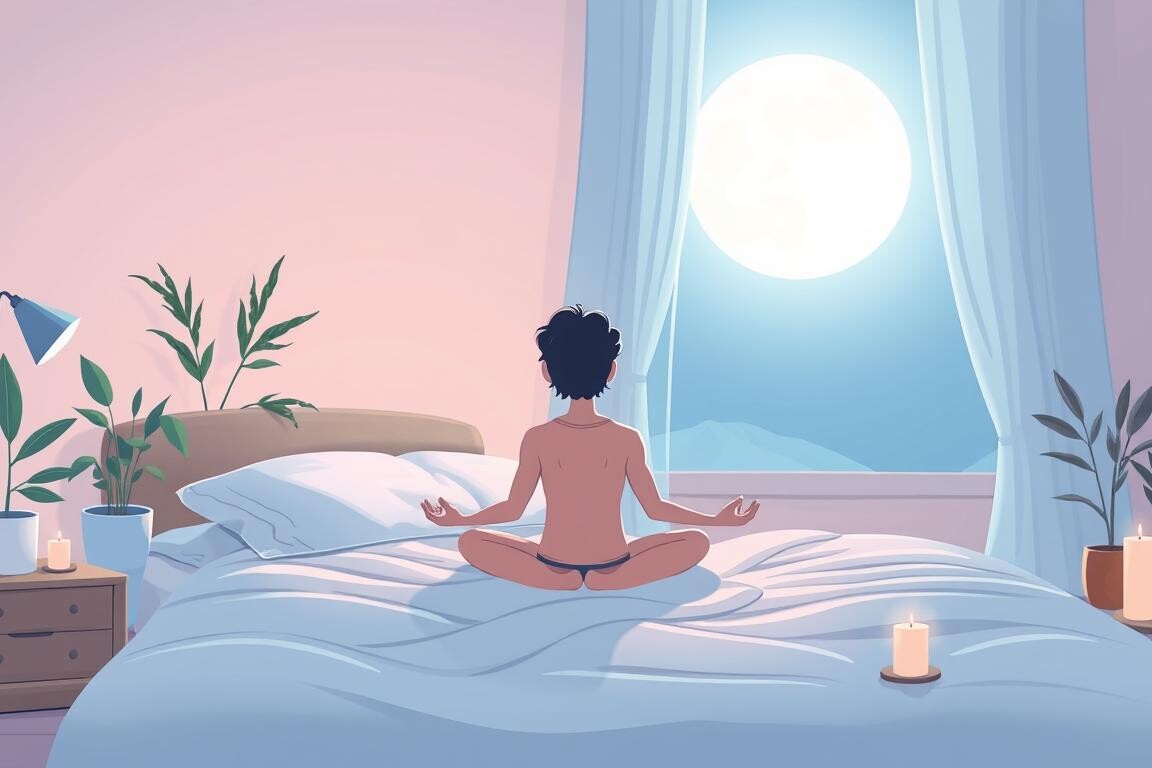Table of Contents
ToggleThe 8 Hours of Sleep Rule Guideline: One Size Fits All?
The idea of 8 hours of sleep being the perfect number has been repeated for decades. Doctors, parents, and health experts often say eight hours is the magic number for rest. But our bodies are not identical machines. Each person has unique needs, shaped by age, lifestyle, genes, and health. For some, eight hours may be too much; for others, it may not be enough. This raises a crucial question: is the eight-hour rule based on science, or is it simply a general guideline?
Why 8 Hours of Sleep Became the Gold Standard
The rule started from early studies on average sleep patterns in healthy adults. Researchers found that most people fell within the seven to nine-hour range. The middle number, eight, was turned into the official standard.
Media and health campaigns simplified the message further, spreading the idea that eight hours was perfect for everyone. In reality, averages can mislead. Sleep is a complex process controlled by your circadian rhythm, and the number of hours is only part of the equation. Your sleep duration may vary from your friend’s or family’s, and that is normal.
Understanding Your Body’s Sleep Needs and Sleep Duration
Your brain and body follow a natural sleep cycle, which includes light sleep, deep sleep, and REM sleep. Moving through these stages properly is more important than counting hours. If your cycles are disrupted, even a long night in bed will not refresh you. For example, a person with untreated sleep apnea may spend eight hours in bed but feel exhausted in the morning. Meanwhile, someone who gets six and a half hours of high quality of sleep may wake up energized.
Think of sleep like nutrition. Saying everyone needs the same calories daily would ignore individual differences. Just like some need more food and others less, sleep duration is highly personal.
Look for These Signs to Know If You’re Getting Enough Sleep and Good Sleep Quality
Instead of focusing only on numbers, listen to your body. Strong signs of proper rest include waking up naturally before your alarm, maintaining good energy all day, sharp memory, and consistent mental focus. You should not need heavy caffeine to stay awake. If you notice constant yawning, irritability, or falling asleep during quiet activities, your rest is not enough.
The real test of quality of sleep is not how long you were in bed, but how you feel throughout the day. If fatigue lingers despite eight hours, your rest is not restorative.
Signs That You Might Need More Sleep for Better Health and Productivity
Poor sleep has a direct effect on your brain and body. Studies show that sleep deprivation slows reaction time and lowers concentration. For students, this means lower grades. For workers, it means more mistakes. For drivers, it increases accident risks. Poor rest also weakens immunity, increases inflammation, and raises risks of diabetes and heart disease.
When sleep and productivity suffer, so does your emotional balance. People with chronic tiredness are more likely to struggle with mood swings, anxiety, and depression. If you wake up tired every day, need long naps, or lose focus easily, your body is signaling that more rest is required.
How to Find Out How Much Sleep You Need Without Risking Insomnia
You can discover your ideal sleep duration by tracking your patterns. On vacation or weekends, allow yourself to wake up naturally without an alarm. Record how many hours you slept and how you felt the next day.
After two weeks, you will notice a pattern. This is your natural requirement. Be careful not to stress over the process, because worry itself can create insomnia. The key is to create balance, not pressure.
Remember, Sleep Quality Counts Too: Why Sleep Hygiene Matters
Rest is not only about quantity. Sleep hygiene plays a key role in how well your body restores itself. Good hygiene includes a healthy bedtime routine like dimming lights, stretching, or reading. Avoid screens, caffeine, and heavy food before bed. Keep your room dark, cool, and quiet. These steps tell your brain it is time to wind down. Proper hygiene ensures you reach both deep sleep and REM sleep, the stages vital for learning, memory, and physical repair.
Factors That Affect Sleep Needs and Sleep Duration

Several influences shape how much rest your body requires.
Age: Why Kids, Adults, and Seniors Need Different Sleep Duration
Babies may need 14 to 17 hours daily, teenagers require about nine, and adults function best for 7 to 9 hours. Seniors often need less but may wake up more often at night. Aging changes the natural sleep cycle, sometimes reducing the amount of restorative sleep.
Lifestyle and Daily Activities: Impact on Sleep and Productivity
An athlete may require longer rest to heal muscles, while a desk worker may not. Late-night study sessions or long work shifts can disrupt the circadian rhythm. To protect sleep and productivity, match your rest with your activity level. Active recovery requires extra rest.
Overall Health: How Illness, Stress, and Insomnia Affect Sleep
Health problems such as pain, heart disease, or depression can interfere with sleep. High stress and anxiety keep the brain alert, reducing quality of sleep. Persistent insomnia can develop, making it difficult to fall or stay asleep. People with sleep disorders like apnea or restless leg syndrome often need medical care to restore healthy rest.
Sleep Quality: Quantity vs. Restorative Rest
Not all hours are equal. If your night is broken by frequent waking, you will not get enough restorative sleep. Eight hours of broken rest cannot match seven hours of uninterrupted deep cycles.
Environmental Factors: Light, Noise, and Bedroom Setup
Your sleep environment matters greatly. Bright light, street noise, or the wrong mattress can disturb rest. A quiet, cool, dark room signals the body to release melatonin, the hormone that triggers sleep. Investing in blackout curtains or a supportive pillow may improve rest quality more than adding extra hours.
Genetic Factors: Natural Short Sleepers vs. Long Sleepers
Some individuals function well with as little as five hours, while others need ten. These patterns are influenced by genetics. Natural short sleepers are rare, but they exist. Forcing yourself to match another person’s pattern may reduce your quality of sleep and daily performance.
Diet and Eating Habits: Foods, Caffeine, and Natural Remedies for Sleep
Food strongly impacts sleep. Caffeine late in the day blocks melatonin release. Heavy meals before bed slow digestion and can cause discomfort. On the other hand, warm milk or chamomile tea are popular natural remedies for sleep. Magnesium-rich foods such as nuts or leafy greens support muscle relaxation. Eating patterns should respect your body’s rhythm.
The Bottom Line
The rule of 8 hours of sleep is useful as a guideline, not a law. Your needs may differ from others. Some thrive on less, others need more. What matters is waking refreshed, alert, and able to function well. Prioritize quality of sleep by practicing good sleep hygiene, building a calm environment, and respecting your body’s signals. Instead of chasing a perfect number, chase the perfect rest that restores your mind and body.
FAQs
Can I sleep 7 hours instead of 8?
Yes, many adults thrive on 7 hours, as long as they wake refreshed, maintain energy, and achieve strong sleep and productivity throughout the day.
Is 10 hours of sleep too much?
Regularly needing 10 hours may signal hidden sleep disorders or illness. Sometimes, after illness or stress, the body asks for more rest to achieve proper recovery.
Can we split 8 hours sleep?
Yes, splitting rest works for some people. As long as your cycles include enough deep sleep and REM sleep, your body can still recover and function well.
What is the 321 before bed?
It means no work three hours before sleep, no food two hours before, and no screens one hour before. This routine builds strong sleep hygiene habits.
What is the 931 sleep rule?
The 931 method suggests 9 hours for children, 3 hours for napping if needed, and 1 hour for relaxing before bed to support a calm circadian rhythm.
What are the ABCs of safe sleep?
Alone, Back, and Crib. Babies should sleep alone in a crib, placed on their back, to reduce risks and ensure safe quality of sleep in early life.
What are the 3 R’s of sleep?
Routine, Regularity, and Restfulness. Following these three helps stabilize the sleep cycle and ensures better recovery for both mind and body.
About The Author

This article is medically reviewed by Dr. Chandril Chugh, Board-Certified Neurologist, providing expert insights and reliable health information.
Dr. Chandril Chugh is a U.S.-trained neurologist with over a decade of experience. Known for his compassionate care, he specializes in treating neurological conditions such as migraines, epilepsy, and Parkinson’s disease. Dr. Chugh is highly regarded for his patient-centered approach and dedication to providing personalized care.
→ Book a consultation to discover which remedies suit your needs best.




